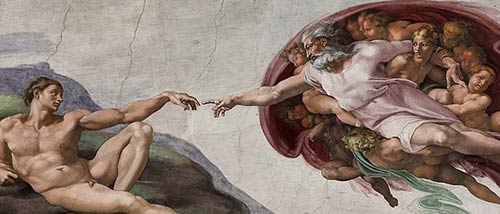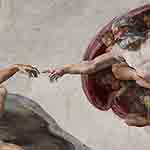
Complete with the journalists’ inability to write copy intelligible English (“…no one directors out fate…“), on Wednesday our newspapers had an article with the headline shouting, “Hawking: There is no God or afterlife”.
Stephen Hawking’s book, Brief Answers to the Big Questions, has hit the shelves. As someone with both a Science degree and a Theology degree (and having studied Philosophy at Tertiary level), I look forward to reading it.
I suspect (the English-language-challenged journalist notwithstanding with his/her {no one is owning up to writing the article} use of “director” as a verb) that when I get to reading the work, Stephen Hawking may actually be more subtle than the six-word-summary headline.
What does one mean by the words “God”, “create”, “afterlife”, “heaven”, “existence”…?
The logical positivism and scientism of something only being true if there is scientific evidence for it is so last millennium. There is no scientific evidence for particular beauty or goodness or morality… There is no scientific analysis of a metaphor… And there is no scientific evidence for the statement that only something with scientific evidence is true!
Attempting to use Science to prove or disprove the existence of God is a great example of a category mistake.
And then there’s the well-known danger of someone being an expert in one discipline feeling like they can make intelligent calls in a completely different area…
Let’s not forget how Stephen Hawking’s ashes were interred:
We have entrusted our brother Stephen to God’s mercy, and we now commit his mortal remains to the ground: earth to earth, ashes to ashes, dust to dust: in sure and certain hope of the resurrection to eternal life through our Lord Jesus Christ, who will transform our frail bodies that they may be conformed to his glorious body, who died, was buried, and rose again for us. To him be glory for ever. Amen.
And, in the article, Stephen Hawking’s daughter, Lucy, speaking about his lack of faith says how her father never liked to be alone, and concludes that now, being with Isaac Newton and Charles Darwin “he would never be alone again.”
If you appreciated this post, do remember to like the liturgy facebook page, use the RSS feed, and sign up for a not-very-often email, …




I think there is scientific evidence for morality. Just ask Simon Bridges and Jami-Lee Ross and their victims.
I suspect there is scientific evidence for beauty eg the mathematics of regular structures, computer analysis of photographs to detect patterns that we consider beautiful, or consider why we consider good weather beautiful (the experience of warmth, light, being able to talk a walk outside etc).
Many people do conclude, based on the scientific evidence of their senses, that there must be a God. And many do experience God’s presence in all sorts of ways, some of which are scientific in the sense of being conveyed through our senses.
Many Blessings
Thanks, Chris.
I am reminded of Romans 1:20
You and I understand we live in a sacramental universe with so much pointing to God. I understand that, in the end, we have the evidence for the signpost, but that the signpost does not prove that where it points exists.
Blessings
That’s a lovely piece of scripture Bosco. I might just have to commit it to memory!
There is plenty scientific investigation of metaphor.
https://www.cl.cam.ac.uk/~es407/papers/survey.pdf etc
I read ABHoT decades ago. It’s quite possible to retain belief having done so; one just has to wise-up from the average assertive fundamentalist and see that some options aren’t so useful. If it pushes thought forward, that’s fine by me.
I do agree with the class error point. Morality strikes me as a more fruitful arena: it’s pretty obvious that any act can be regarded as moral if it benefits its species as a whole; however beyond that, morality is more an emergent consequence of things biology addresses.
Thanks, Tim. I look forward to reading the article. I was meaning that one determining what a metaphor means requires a different epistemology. “cold feet”; “a heart of stone”; “an old flame”… Blessings.
Stephen Hawking by his statement has heaped judgment on himself, no need for me to judge him, and his place in eternity has been set by YHWH our CREATOR, remember that scripture says “after death, judgment follows”. (For ALL of us, even myself) God is a fair and impartial judge and will apply the scales honestly.
Thanks, Dennis. As I indicated in my post, I look forward to reading what Stephen Hawking’s actual statement is. It may not at all be the journalist’s summary. Blessings.
I don’t think you can use what others chose to say and do at his funeral as evidence he believed in God. It’s only evidence that they do unless we know Hawking himself left those directives.
Thanks, Cindy. I haven’t seen anyone use what others chose to say and do at Stephen Hawking’s funeral as evidence he believed in God – so I’m wondering where you get that idea. If Stephen Hawking really was an atheist and as convinced of the non-reality of the afterlife as the journalist makes out (as I indicated, I have yet to read the book), then at the very least the words at his funeral were highly ironic.
Unlike you, I wouldn’t even think that it’s necessarily “evidence that they do”. Seeking evidence of a person’s beliefs is fraught.
As I’ve indicated earlier, I’m taken with Stephen’s response in
Andrew Graystone’s interview:
And, at the end of the day, I’m more interested whether I believe in God – and whether my life lives that.
Blessings.
The idea of a Christian funeral for Stephen Hawking was absurd and insulting (just as it would have been for Bertrand Russell) but that’s the way the Establishment works: it ignores the facts and presents an “inclusive” image that fools nobody who thinks honestly about it. Hawking made quite clear in his later years that he did not believe in God in any recognisable theistic or deistic sense. His first wife and the mother of his children, on the other hand, was and is a Christian. The English Establishment still likes to carry on a fantasy that “all is well”, and the Church of England participates in this charade through things like Royal Weddings and State Funerals for atheists.
In any case, it is clear that (natural) science investigates only one portion of reality – the “physical” – and when push comes to shove, it cannot even say what the “physical” is or what forces are. This isn’t a fatal weakness, only a reminder that natural science has its own borderlands – where it comes up against philosophy, including religious philosophy – as well as depending on a number of hypotheses or assumptions that are, strictly speaking, not ‘scientific’ or empirically verifiable, such as the reliability of our senses, the connection between appearance and reality, the predictable mathematical structure of reality, the uniformity of nature and the existence of abstract objects (like numbers, relations, qualities and so forth). What we discover (yet again) is that good scientists are not often very good philosophers. The death of philosophy is periodically proclaimed (as it was, for example, with the Logical Positivism) in the 1930s), only to rise again in the following generation. The most recent attempt to kill philosophy was the neo-Marxist nonsense of postmodernism, a kind of sickness that infested literature and sociology, and it has called for a great act of will and clarity of thought to shake this infection off.
Was Stephen Hawking such a top-notch scientist? He was a great achiever, but Roger Penrose is at least his equal and probably more of a pioneer. Hawking captivated the world’s attention by his long, brave battle with illness and he was certainly a media star -as well as a complicated person as his marital history shows. But I think there are other physicists of the latter half of the 20th century who have the creative edge on him.
Not sure why or to whom it is insulting or absurd. I feel the statement from his children sums it up:
“‘Our father lived and worked in Cambridge for over 50 years. He was an integral and highly recognisable part of the university and the city. For this reason, we have decided to hold his funeral in the city that he loved so much and which loved him. Our father’s life and work meant many things to many people, both religious and non-religious. So, the service will be both inclusive and traditional, reflecting the breadth and diversity of his life.” https://www.cai.cam.ac.uk/news/funeral-date-announced-professor-stephen-hawking
I prefer to respect the family’s wishes in times like this as I assume they are closest to understanding what he may have wanted or wished. I wish them strength during these times (as they have had to have throughout their lives) and feel that any blessing at any funeral is welcome–this is a time for comfort, not pedantry.
Blessings —
Thanks, Stephen. For those following this thread, Stephen is replying to Kevin. Blessings.
Stephen Hawking: “There is no God. There is no afterlife.”
Jesus: “Surprise!”
Hawking: “Oh s**t.”
“Oh s**t. That wasn’t my computer — that was my own voice!”
Jesus: “Yeah, that’s how it works here. Now come give me a hug.”
Hawking: “I can’t. I’m in a wheelchair.”
Jesus: “Don’t be such a dumbass. Stand up, kick your wheelchair into the corner, and come give me a hug.”
Hawking: “Now I’m embarrassed.”
Jesus: “Don’t be. You got a lot of things right. Nobody gets everything right. Now let’s go talk to Dad. He’ll explain what quarks really are. It’s a lot more complicated than you guys ever thought. Bill Ockham is still pretty ticked off about it.”
Awesome, William! 😀 Blessings.
Oh yes, Universalism is “Awesome”, ain’t it?
No need to worry about that church and religion rubbish, and certainly not that mumbo-jumbo about ‘Jesus dying for your sins’ and ‘putting your faith in Him’. If God exists, he/she/it (who knows, anyway?) will let you into “heaven” if you’ve been a good bloke – or if you haven’t been good, at least you’ve been “interesting”.
Yes, salvation by sort-of works still lingers on in the dying religious conscience of the post-Christian New Zealander – dying along with the Anglican Church. Awesome indeed. I wish I stood at the pearly gates to hear these mythical conversations as well. Serious question: how is Anglicanism going to continue in Christchurch when there is hardly a Sunday school left in most of its churches and most congregants are over 55?
Thanks, Mike. I didn’t read Universalism into William’s comment. I didn’t even take it literally. But, we could press that further: is the whole goal of religion simply eternal life insurance? The opposite to “salvation by sort-of works” often appears to be: “accept Jesus as your personal saviour… after that do whatever you like”.
As to your serious question: what evidence is there that the Sunday school model in the 21st Century leads to adults of faith? I certainly remain unconvinced. And why be particularly concerned about the survival of Anglicanism – is that the one, true faith, and only way? In the bigger picture, having been to major areas of the world where Christianity was once dominant and now has long essentially disappeared, I’m not convinced Christianity will survive here, and elsewhere. There seems to be quite a shift towards the Two-Thirds World.
Blessings.